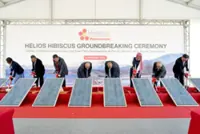THE transition to green energy is in full swing, but are consumers convinced of the benefits? Last year, global investment in low-carbon technologies surpassed US$1.1trillion (RM4.59 trillion).
Geopolitical tensions and the resulting energy crisis acted as catalysts, accelerating spending. Analysts suggest that the rapid injection of capital may have shortened the energy transition timeline by up to 10 years. However, a new global consumer insight warns that wavering consumer confidence could pose a challenge to the progress made.





